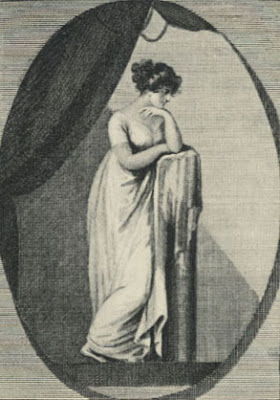 Ooh, look! The Theatre Royal, Covent Garden — my favorite Regency Theatre, home to Kemble and Siddons and the other Kemble and the other two Kembles. (And Siddons was a Kemble by birth! Can you say nepotism?)
Ooh, look! The Theatre Royal, Covent Garden — my favorite Regency Theatre, home to Kemble and Siddons and the other Kemble and the other two Kembles. (And Siddons was a Kemble by birth! Can you say nepotism?)
As long-time Risky Regencies readers know, Todd and I both have the acting bug. For the past three winters, we have taken part in a Shakespeare play at Caltech, beginning rehearsals in early January, and opening in mid-to-late February. Two years ago we were in Measure for Measure, last year was As You Like It, and this year, it’s The Winter’s Tale.
(By the way, if you have any interest in my blog entries on the Regency text of As You Like It and our production, here are the links:
As You Like It #1
As You Like It #2
As You Like It Costume Reflections )
 By the way, this fair lady is Sarah Siddons herself, in the role of Hermione in The Winter’s Tale; the artist is Adam Buck.
By the way, this fair lady is Sarah Siddons herself, in the role of Hermione in The Winter’s Tale; the artist is Adam Buck.
Because this is where my mind is nowadays (busily reciting lines, and trying to remember when it’s “good my liege” and when it’s “good my lord”, and which time I say “pray you now” instead of “pray you then” or “I pray now” or “pray you, Emilia”), for the next few weeks, I’m going to blog about The Winter’s Tale, and talk about the Regency take on it, and on theatre in the Regency.
The Winter’s Tale, of course, is not one of Shakespeare’s best-known works, so I’ll start by giving a little explanation of the plot. (Anyone who doesn’t want spoilers for The Winter’s Tale, stop reading now!!!)
 This photo is Judi Dench playing Hermione for the Royal Shakespeare Company in 1969, as the copyright notice proudly informs you!
This photo is Judi Dench playing Hermione for the Royal Shakespeare Company in 1969, as the copyright notice proudly informs you!
Generally considered one of Shakespeare’s last plays, and usually categorized nowadays as a romance (or a problem play or a comedy), The Winter’s Tale is in many ways a bizarre drama. The first half is tragedy, with lots of screaming and crying and death, and the second half is comedy (and musical), with so much laughter, new love, and joy that some of the folks who died in the first half actually come back to life.
 This is another RSC picture — Patrick Stewart and Gemma Jones as Leontes and Hermione in a 1981 production. Hey, since when does Patrick Stewart have hair??? 🙂
This is another RSC picture — Patrick Stewart and Gemma Jones as Leontes and Hermione in a 1981 production. Hey, since when does Patrick Stewart have hair??? 🙂
As the play begins, all is well. Good King Leontes has a perfect wife in good Queen Hermione, a young son, and a new baby on the way. His pal, King Polixenes, has been staying with them for a delightfully long time, which happens to be…hmmm…yes, just about nine months now. Nine…months. What an interesting length of time. Let’s see… Hermione is eight months pregnant… And Polixenes arrived nine months ago…
 Here’s Ian McKellan as Leontes, in 1976.
Here’s Ian McKellan as Leontes, in 1976.
Well, King Leontes, it seems, has a little strain of insanity in him. With no warning, he suddenly becomes convinced that Polixenes is the father of Hermione’s unborn child. Now, madness is one thing — many good kings are a little mad much of the time — but Leontes refuses to listen to anyone but himself. All the men in the court beg him to forgo his suspicions, or at least be merciful. And one noblewoman in particular, the rather pushy Paulina, actually has the courage to tell him in blunt terms that he’s totally in the wrong, and had better stop now, or else.
In his pride, Leontes refuses all advice, all common sense, and even the advice of the gods. He decides to kill Polixenes — and when he’s foiled in his aim, he takes out his wrath on his queen and her (now newly born) baby daughter.
 Here’s Gillian Barge as Paulina and Jeremy Irons as Leontes, in 1986.
Here’s Gillian Barge as Paulina and Jeremy Irons as Leontes, in 1986.
Needless to say, great tragedy ensues.
The roles of Leontes, Hermione, and Paulina, for obvious reasons, have long been prized by actors (including Regency greats such as Kemble and Siddons). In our production, Todd gets to rant as Leontes, and I get to yell at him plenty as Paulina, so we’re both having oodles of fun.
However, to Regency fans, the most famous roles in the play may be Florizel and Perdita. Leontes has his newborn daughter abandoned in the wilderness where, as so often happens in fiction, she survives, and is raised by a kindly shepherd who calls her Perdita, as the mysterious documents that were found with her instructed.
Eventually, Perdita meets Prince Florizel, the son of King Polixenes, and of course they fall in love.
Dorothy Jordan played Perdita, as did, of course, Mary Robinson, the Perdita who snared the Prince of Wales before he was Regent — giving him the nickname of Florizel.
More about the Regency versions (and 18th century abridgements) of The Winter’s Tale next week!
So, today’s questions:
Have you ever seen or read The Winter’s Tale? What did you think?
How do you think Patrick Stewart looks with hair?
Are you a Shakespeare fan? Which are your favorite plays? And have you ever acted in one of Shakespeare’s plays?
All comments welcome!
Cara
Cara King, author of My Lady Gamester, which spends a chapter or two at the Theatre Royal Covent Garden, complete with elephant
 Having been accused (several times) of despising gratuitous mantitty, I present for your delectation the following…
Having been accused (several times) of despising gratuitous mantitty, I present for your delectation the following…
 Patrick Stewart who could make it so with me anytime. Not only can he wear spandex in public and not be embarrassed but he can sing and dance too. Check it out.
Patrick Stewart who could make it so with me anytime. Not only can he wear spandex in public and not be embarrassed but he can sing and dance too. Check it out. Peter O’Toole, once a lovely young thing, now a lovely, if cadaverous, old thing who could cross my desert any time.
Peter O’Toole, once a lovely young thing, now a lovely, if cadaverous, old thing who could cross my desert any time. Alan Rickman, the underground hit of Sense and Sensibility,.Women swooned at his imcomprehensible upperclass mumble and the slow crawl of his jowls seeking freedom from his high collar.
Alan Rickman, the underground hit of Sense and Sensibility,.Women swooned at his imcomprehensible upperclass mumble and the slow crawl of his jowls seeking freedom from his high collar. Ian McKellen, quite definitely a player for the other team and never the prettiest boy in the playground, but he does have a certain … something. There’s just something about him that makes you want to comb through his beard for snacks or offer to hold his staff if he looks tired.
Ian McKellen, quite definitely a player for the other team and never the prettiest boy in the playground, but he does have a certain … something. There’s just something about him that makes you want to comb through his beard for snacks or offer to hold his staff if he looks tired.





